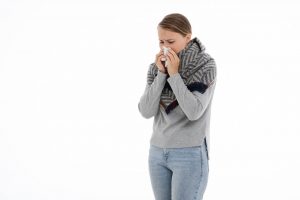Immunity, what is it exactly? And how does it help us protect ourselves?
You are asking yourself the same questions and many more, aren’t you?
Indeed, the importance of having a strong immune system was always huge, but when COVID-19 shook the world, the evocation of this term was amplified: “you have to boost your immune system, you have to eat well to strengthen your immunity” .
Immunity is a research topic that all scientists are concerned about, and we are also very concerned about it too.
Living beings are always in contact with pathogens, such as bacteria, viruses and parasites, and to protect themselves against the intrusion of these pathogens into the body, there are barriers such as the skin or tears.
Despite these barriers, pathogens manage to enter the body. This is where our immunity comes into play: we have two ways of responding to an attack by a pathogen: the innate and acquired immune response .
We can deduce that immunity is an essential protector because it allows our organism to defend and protect itself against all foreign substances such as the COVID-19 virus, that’s why we ask you to eat healthy in order to have the capacity to resist against the virus , and to stay away from old people because aging makes the immune system very vulnerable.
The different types of immunity:
In order to distinguish the different types of immunity, we will explain the specifications and roles of each one.
The function of our immune system is to distinguish foreign substances from those that are part of our own body, the parts of any foreign substances that are recognized by our immune system are called antigens. These are present in bacteria, viruses and foreign cells introduced into the body during a transfusion or organ transplant, it can also be chemicals.
1 / Innate response
The first line of defense of our organism against foreign substances is constituted by the different physical barriers it has to prevent their entry: tears, gastric acid and skin. However, if foreign substances manage to get past the barriers, for example by bacteria entering the body through the skin, the antigens encounter large, non-specific white blood cells called macrophage that reside in the skin.
If the macrophage is able to detect that the antigen is foreign and does not belong to the body, it engulfs it through a process called phagocytosis and can destroy it. Inflammation at the site also causes the secretion of small proteins called cytokines that help regulate the immune response and attract additional macrophages to the site from the circulation. This initial and immediate response is called innate, it is not specific and it does not retain any memory of this encounter with the antigen. It only becomes effective when the body is repeatedly confronted with the same antigen.
2 / Acquired response
Secondly, an acquired response is slower to develop. Indeed, sometimes the innate response is not sufficient to eliminate the antigen. In addition to their phagocytosis capacity, macrophages can also transport the antigen to sites where an immune response is acquired, adapted to that particular antigen.
When a macrophage carrying an antigen enters the lymphatic system, it is transported through a network of lymphatic vessels to the lymphoid organs. The lymphoid organs, rich in two types of leukocytes: B and T cells, are distributed in strategic sites throughout the body to react to antigens. Many B and T cells also circulate in the blood. It is then characterized by a specificity and an immune memory.
Tips to boost and strengthen immunity:

To be able to resist diseases easily, it is essential to take care of and protect yourself.
Having a strong immune system is equivalent to saying that we are well protected against external aggressions , in fact it is possible to boost immunity through a healthy lifestyle such as quality sleep, practicing sport daily and especially following a healthy and balanced diet. To achieve good health and fitness, foods rich in vitamin C are preferred because of their crucial role in the immune mechanism, since this vitamin is not produced by the body, so it must be acquired through food.
Vitamin C is found in red fruits, kiwi, broccoli, red bell pepper. You will also need vitamin D to activate the immune defense system. It is produced by the skin thanks to sunlight. Also consume foods from the alliaceae family such as garlic, onion. If you do not like these foods you can buy food supplements such as vitamin D especially in winter when the sun is not there. Moreover, the purpose of food supplements is to complete the normal diet by providing nutrients in large quantities to compensate for the lack of the body.
Three symptoms of a weakened immune system:

Fatigue, colds, sore throats … can be a sign of a weakened system. Diet also plays a major role, so a poor diet can weaken our immunity, as well as stress or infections that can prevent the performance of certain basic functions.
It is important to know the symptoms that your body is sending you in order to try to find the origin of the weakness and compensate for it later.
First of all, always feeling tired, a weakened immune system generates fatigue. Of course, you can feel tired from time to time, but there are symptoms that should not be ignored (continuous fatigue; feeling exhausted when you wake up).
Then, if you are susceptible to flu virus, sore throat, or cold, then your system will not allow you to defend as you should.
Some people suffer from allergic reactions more than others, because their system does not block the influences of pollen, dust.
Final thoughts:
As you can see, immunity is what protects our body against all infectious agents , that’s why we have to take care of it while having a good diet, quality sleep as well as other tips that we have mentioned earlier. Any weakening of this system can lead the person to pathologies and diseases. Main Herbalist encourages you to boost your immune system because your health is a priority.
Tell us in comments, what foods do you eat to boost your immune system?
For any additional information, please feel free to comment.
